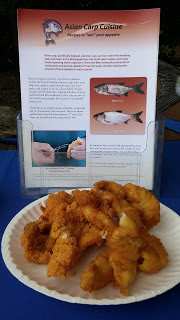
Optimism was high at the International Conference Asian Carp in Peoria a week ago Friday. The goal of this event, sponsored by the Greater Peoria Economic Development Council, was to bolster the economy of the region by networking and sharing ideas and information on marketing Asian carp. And many of the attendees were very interested in exploiting this fishery.
Natural resource managers and entrepreneurs have a similar goal at this point, which is to remove Asian carp from the Illinois River. This bodes well for the river’s future.
IISG was in the room to share outreach information about Asian carp to participants from as far away as China and South America. The audience also represented a variety of professions, including researchers, food service professionals, processors, investors, and more.
In recent years, several Midwest businesses have jumped into the carp market. Schafer Fisheries, for example, has developed new products, such as dog treats and liquid fertilizer, but also processes fillets. Asian carp species have a mild flavor, and the conference crowd was treated to a variety of inventive carp dishes, from spring rolls to chili, which were all delicious.
The “if you can’t beat ‘em, eat ‘em” mantra has reaped some rewards. Matt O’Hara, with Illinois Department of Natural Resources, reported that the three-year catch at Marsielles Pool along the Illinois River has steadily declined. The leading edge of Asian carp moving towards the Great Lakes has stayed miles away from this critical freshwater resource.
If the enthusiasm at the conference translates to successful businesses, at some point they will need to be prepared to diversify when carp species have been reduced to manageable levels. At that point, they may be able to shift to native fish, which, in fact, are more lucrative.
Peoria was also the host for the annual Asian carp bowfishing tournament on Saturday, and IISG was there to talk with participants about how to prevent the spread of Asian carp and other invasive species. Both events were rescheduled from July due to high waters earlier in the summer. As it turns out, flood waters are very good for spawning. It’s likely that we’ll see Asian carp numbers increase in the future because they had a good spawn this year.



